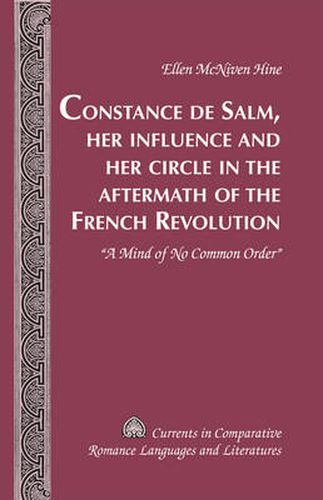Readings Newsletter
Become a Readings Member to make your shopping experience even easier.
Sign in or sign up for free!
You’re not far away from qualifying for FREE standard shipping within Australia
You’ve qualified for FREE standard shipping within Australia
The cart is loading…






This title is printed to order. This book may have been self-published. If so, we cannot guarantee the quality of the content. In the main most books will have gone through the editing process however some may not. We therefore suggest that you be aware of this before ordering this book. If in doubt check either the author or publisher’s details as we are unable to accept any returns unless they are faulty. Please contact us if you have any questions.
Largely forgotten during the second half of the nineteenth century and throughout most of the twentieth century, Constance de Salm (Constance-Marie de Theis, Mme Pipelet de Leury, later Princess de Salm-Reifferscheid-Dyck,) finally attracted the attention of such scholars as Elizabeth Colwill, Genevieve Fraisse, Huguette Krief, and Christine Plante in the early twenty-first century. However, there has to date been no comprehensive study of her published works, her vast correspondence, and the importance of her cultural exchanges. In this book, Ellen McNiven Hine contributes to the recent upsurge of interest in the literature of this particularly turbulent period in French history. This book considers not only her literary aspirations and claim to fame but also such topics as her contribution to the scientific culture of the period, the extent of the political involvement of a non-activist woman, her challenge to what she saw as inequitable provisions in the Civil Code, her championing of women’s progress in literature and the arts, and the role that networking and patronage played in her personal and professional life. Moreover, the study highlights the similarities and differences between her life, writing, and influence and those of other postrevolutionary women such as Mary Wollstonecraft, Germaine de Stael, Margaret Somerville, and Louise Colet.
Constance de Salm uses a variety of genres to address issues of particular importance to women, such as equal access to educational opportunities, the cost to women’s health of reproduction, and lack of economic resources for single and widowed women. She displays a surprising modernity in her awareness of the difficulty of resolving relationship, career, and motherhood problems that continue to plague women in the twenty-first century and points to a future in which women will have access to educational and employment opportunities.
$9.00 standard shipping within Australia
FREE standard shipping within Australia for orders over $100.00
Express & International shipping calculated at checkout
This title is printed to order. This book may have been self-published. If so, we cannot guarantee the quality of the content. In the main most books will have gone through the editing process however some may not. We therefore suggest that you be aware of this before ordering this book. If in doubt check either the author or publisher’s details as we are unable to accept any returns unless they are faulty. Please contact us if you have any questions.
Largely forgotten during the second half of the nineteenth century and throughout most of the twentieth century, Constance de Salm (Constance-Marie de Theis, Mme Pipelet de Leury, later Princess de Salm-Reifferscheid-Dyck,) finally attracted the attention of such scholars as Elizabeth Colwill, Genevieve Fraisse, Huguette Krief, and Christine Plante in the early twenty-first century. However, there has to date been no comprehensive study of her published works, her vast correspondence, and the importance of her cultural exchanges. In this book, Ellen McNiven Hine contributes to the recent upsurge of interest in the literature of this particularly turbulent period in French history. This book considers not only her literary aspirations and claim to fame but also such topics as her contribution to the scientific culture of the period, the extent of the political involvement of a non-activist woman, her challenge to what she saw as inequitable provisions in the Civil Code, her championing of women’s progress in literature and the arts, and the role that networking and patronage played in her personal and professional life. Moreover, the study highlights the similarities and differences between her life, writing, and influence and those of other postrevolutionary women such as Mary Wollstonecraft, Germaine de Stael, Margaret Somerville, and Louise Colet.
Constance de Salm uses a variety of genres to address issues of particular importance to women, such as equal access to educational opportunities, the cost to women’s health of reproduction, and lack of economic resources for single and widowed women. She displays a surprising modernity in her awareness of the difficulty of resolving relationship, career, and motherhood problems that continue to plague women in the twenty-first century and points to a future in which women will have access to educational and employment opportunities.